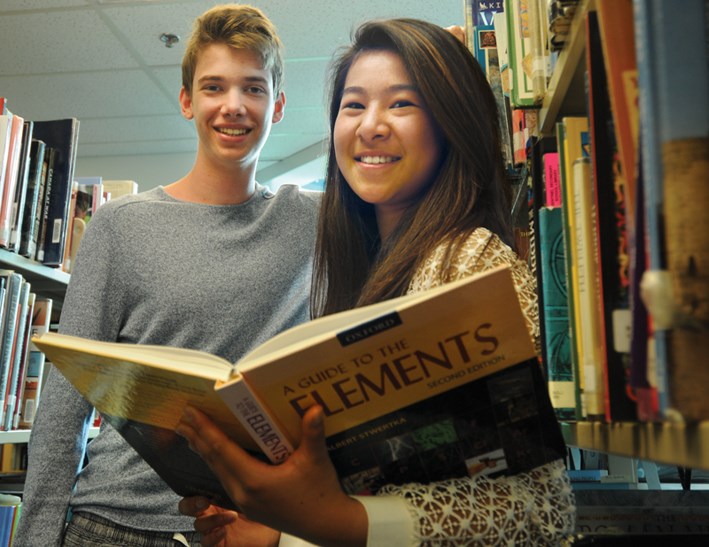When Sentinel high school students Larissa Chiu and Hank Lendvoy began work on their major projects for their Grade 12 school year, neither had a textbook they could turn to for answers.
But in their case, that was the point.
As part of the Capstone program at the West Vancouver high school, the students were charged with designing and carrying out a research project that would produce new information in their field of interest.
“There’s no textbook,” said Lendvoy. “It has to be new knowledge.” As a first step, “You have to read all the textbooks to find out what’s not in the textbook.”
For these students, finding out what isn’t known – and what they’re passionate about discovering – are two important parts of the process on Capstone’s two-year journey of learning.
The program, now wrapping up a second year at Sentinel, essentially takes motivated high school students through a university research curriculum, ending with a project in which students design their own research question and come up with a way to answer it.
In the first year of the program, students learn about credible sources, how to find and synthesize information, and research methods including designing experiments and field research. In the second year, students work on a project designed to answer a research project, write a 15- to 20-page research paper on it and defend their research in an oral presentation.
If that sounds more like a PhD thesis than high school, there’s good reason for that. Even the titles of some of the research papers the students have produced are just a wee bit intimidating.
Topics students have examined run the gamut of examining why Squamish Nations students choose to take part in a First Nations language program or not, to the impacts of a concussion management program on student athletes’ return to learning.
“The fascinating part is when the students know more about a topic than the teacher does,” said Christian Obeck, one of the Sentinel teachers who oversees the Capstone program. That happens a lot.
“I learn a ton about things I never thought I’d know anything about,” he said.
For both Chiu and Lendvoy, the chance to direct their own learning independently and pursue interests they are passionate about was a huge draw of the program.
Identifying that interest is often “the hardest part of the process,” said Obeck. Some students aren’t really aware of what interests them at the beginning, while others come in with one idea and end up pursuing another.
For their projects, both Chiu and Lendvoy did original research under the guidance of outside academic mentors – Chiu in the field of child brain development and Lendvoy in an examination of biometric blood markers and their association with osteoarthritis.
Under the direction of an educational psychologist at UBC, Chiu designed an experiment to see if parents’ stress levels correlated with young children’s ability to self-regulate – a cognitive skill considered one of the key markers of later success in school.
Chiu’s project involved soliciting parent volunteers from a cross-section of socio-economic levels in the Lower Mainland to answer questions then getting young children to perform a simple test.
“The ‘pre-work’ was pretty heavy,” said Chiu – including getting a criminal records check to go into daycare settings and getting her study vetted by a UBC ethics committee. Her study showed parental stress did, in fact, have an association with kids’ cognitive abilities.
That’s important she said, because it has real-world impacts. The way children’s brains develop in the first six years of life has a huge impact on future success, she said, and it’s important to address parents’ roles in that.
For Lendvoy, three mentors in the field of biotech research helped him design and carry out a study to see if particular bio-markers were linked to the progression of osteoarthritis. The project involved obtaining blood samples from one medical research expert, use of another’s biotech lab, complete with robot-assisted testing, and funding of between $3,000 and $4,000 from a third mentor to actually carry out the tests.
After a year-long project and many hours in the lab, Lendvoy got a surprise when the results came back: his hypothesis that the bio-markers would be connected to a mild form of the disease was wrong.
“I’m still kind of struggling with it. But knowledge is knowledge. Especially in science,” he said. “A positive is flashier and a bit more fun to talk about. The negative is still new knowledge.”
The project also won Lendvoy third place in a provincial biotech research contest for high school students sponsored by the biotech company Sanofi.
Somehow between spending long hours on their projects, both Lendvoy and Chiu found time for other interests: Lendvoy golfs, plays basketball and took a full slate of other advanced placement courses at Sentinel while Chiu volunteers as a St. John’s Ambulance first responder, ski races, snowboards and has her pilot’s licence in addition to her academic studies.
Obeck said in the first years of the program, Capstone has definitely attracted academically advanced and driven students. But in future, he said, one goal is to adapt the program so it can be introduced in some form to a broader cross-section.
While students have sometimes had an easier time connecting with their passions through sports and arts programs, that’s traditionally been more difficult in an academic arena, he said.
“We’re recognizing a program like this is important for all students.”



